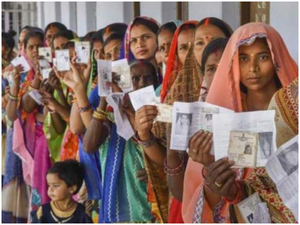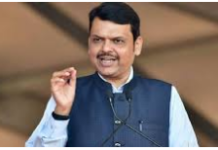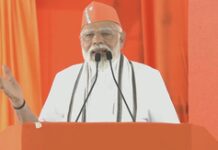
New Delhi, Feb 3 (IANS) The advent of technology has led to digital mediums of people outreach programs taking precedence over the conventional poll campaigns.
Political parties are increasingly adopting online canvassing over orthodox mediums. However, this has also made the electoral machinery ‘vulnerable’ to the flip side of technology.
Artificial Intelligence (AI) induced fake narratives and mis-information have also added to the humungous task of dealing with fake news, especially during elections.
As India prepares for general elections 2024, the agenda and propaganda machinery by the West-backed tech giants is set to get activated again for pushing their ulterior motives.
Twitter’s latest disagreement with Centre over identification and banning of a couple of accounts has brought the spotlight back on the social media behemoth’s attempt to influence country’s Parliamentary elections, in 2019.
In latest face-off, Twitter objected to Centre’s directions to withhold certain account and posts and called it a move to ‘quell the freedom of speech’ but then agreed to comply with the order.
The ‘propaganda machinery’ of US-based tech giants pose a big challenge during this election season also. In 2019 elections, the interference and meddling into India’s electoral affairs by these transnational firms, apparently with the blessing of their governments, was widely seen. These companies colluded with left-liberal ecosystem to devise anti-establishment campaign, with a motive to mobilise public against the Modi dispensation.
In 2019, Jack Dorsey-led Twitter, now X, resorted to ‘malafide’ tricks and stratagems to show the then government in bad light while amplifying the baseless and wild allegations against it.
His close association with left-liberal lobby and alleged misuse of social media for furthering vested interests was also called upon by the supposed right-wing outfits. In one of the viral photos, he was seen flaunting ‘Smash Brahminical Patriarchy’ poster for which he received huge backlash and also apologised later.
Twitter’s then CEO Jack Dorsey was also accused of promoting anti-Hindutva accounts during 2019 polls, with an intention to ‘bring the government down’ and later also summoned by the Standing Committee on IT.
Jorsey had accused Indian government of pressuring Twitter to block certain accounts but it was rubbished by Centre as ‘blatant lie’.
With the world going digital, manipulating the public during elections has become easy and centric. Western powers, via their tech giants, ‘invade’ the democratic process of third world countries in name of ‘data sovereignty’ and when they are dragged to courts, a separate ecosystem goes full throttle to defend them.
In 2019 elections, many intermediaries, besides the tech behemoths, also tried to infringe upon India’s election process by manipulating data. They took use of algorithms, data analytics to study voters’ inclination and then influenced their minds by populating their social media timeline with ‘motivated content’.
A report by US-based think tank, soon after 2019 elections, indicted the Twitter for swaying public opinion in partisan manner.
Twitter bots were boosting hashtags and trying to manipulate traffic on Twitter in February 2019 ahead of the then General elections, said The Atlantic Council, while quoting a study done by the Digital Forensic Research Lab (DFRLab).
With 2024 elections around the corner, similar concerns and consternations have started coming to fore. The Election Commission is expected to formulate a strategy to counter the ‘deep fakes’ much like it did in calling out the fake news, ahead of 2019 elections.
‘Deep fakes’ pose a huge threat because of their potential to subvert the entire election process with their manipulative and scheming content. The recent cases of deep-fake videos are a case in point for understanding the emerging dangerous trend.
During recent Assembly elections in five states, thousands of voters in Telangana received a viral video on their phone, with a sitting legislator appealing them to vote against the incumbent government. In Madhya Pradesh, AI-induced videos of popular TV show ‘Kaun Banega Crorepati’ created a frenzy of sorts among public.
The video, designed on lines of popular quiz show asked questions from public and sought to whip up sentiments against then Shivraj Singh government.
Notably, India is not the only country facing the menace of ‘deep fake politics’ and deceptive AI-induced campaign. The digital revolution has exposed even the strongest economies to possible interference in their electoral process and gave rivals an easy handle to target the ruling governments with slanted narrative and rhetoric.
The US presidential primary elections in New Hampshire also became a victim last year, as a fake audio of President Joe Biden appealed to people, ‘stay indoors and not participate in polls’.
Alarmed over this looming crisis, a group of 20 global tech companies recently signed an accord to work together to prevent AI-induced content from interfering in elections.
Interestingly, the 2024 Lok Sabha elections is drawing the attention of world on back of much-touted third term for PM Modi-led NDA government while INDIA alliance pulling out all stops to put brakes in BJP’s ‘victory march’.
Moreover, year 2024 is set to witness Parliamentary or Presidential elections in 17 European nations. Hence, the need for crackdown on fake news, fake narrative and fake propaganda becomes all the more important.
–IANS
mr/dan
Disclaimer
The information contained in this website is for general information purposes only. The information is provided by TodayIndia.news and while we endeavour to keep the information up to date and correct, we make no representations or warranties of any kind, express or implied, about the completeness, accuracy, reliability, suitability or availability with respect to the website or the information, products, services, or related graphics contained on the website for any purpose. Any reliance you place on such information is therefore strictly at your own risk.
In no event will we be liable for any loss or damage including without limitation, indirect or consequential loss or damage, or any loss or damage whatsoever arising from loss of data or profits arising out of, or in connection with, the use of this website.
Through this website you are able to link to other websites which are not under the control of TodayIndia.news We have no control over the nature, content and availability of those sites. The inclusion of any links does not necessarily imply a recommendation or endorse the views expressed within them.
Every effort is made to keep the website up and running smoothly. However, TodayIndia.news takes no responsibility for, and will not be liable for, the website being temporarily unavailable due to technical issues beyond our control.
For any legal details or query please visit original source link given with news or click on Go to Source.
Our translation service aims to offer the most accurate translation possible and we rarely experience any issues with news post. However, as the translation is carried out by third part tool there is a possibility for error to cause the occasional inaccuracy. We therefore require you to accept this disclaimer before confirming any translation news with us.
If you are not willing to accept this disclaimer then we recommend reading news post in its original language.













